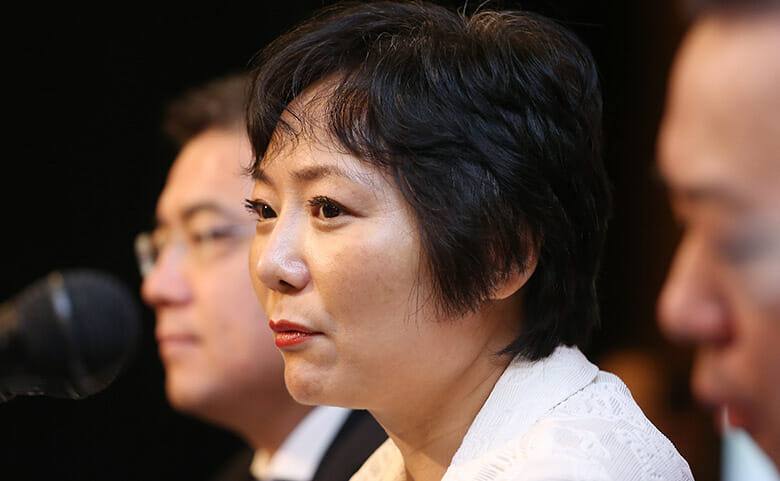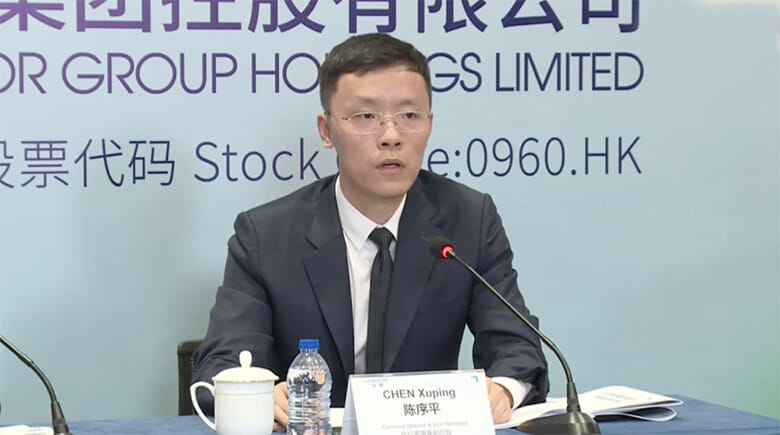
Among China’s wealthiest women, Wu Yajun is said to have resigned for health and age reasons (Getty Images)
The billionaire founder of Longfor Group Holdings has become the latest mainland entrepreneur to step back from corporate leadership in China, according to an announcement late Friday by the Hong Kong-listed developer.
With Longfor’s stock having already lost nearly 60 percent of its value from the beginning of the year amidst a more challenging economic and political environment, the company said that Wu Yajun, 58, who founded the company in 1993 along with her then-husband in 1993, was stepping down immediately for age and health reasons.
While Longfor has boasted some of the strongest financials among private sector Chinese developers this year, investors spooked by bond defaults and falling home sales responded by driving down the company’s stock by as much as 45 percent today before it closed with its lowest price since 2011 at HK$10.00 ($1.27) per share.
Wu’s departure comes during an extended period of challenges for private companies across some of the largest sectors of the mainland economy, with billionaire entrepreneurs including Soho China’s Pan Shiyi and ByteDance’s Zhang Yiming having stepped away from their official roles since early 2021.
Junior Varsity
Following her resignation, Wu, whose family office owns over 40 percent of Longfor’s stock, will become a strategic development consultant to the group, with chief executive Chen Xuping taking over as chairman.

New chair Chen Xuping joined Longfor’s board last year
Now 40, Chen first joined the company in 2008 and has moved up the ladder from construction manager to become an executive director in August last year before being named CEO in March.
Ranked as China’s eighth largest developer by contracted sales, Longfor said Wu’s resignation reflects the company strategy to institutionalize operations, and that it has has full confidence in the new management team.
With support from partners including Canada’s CPPIB, Longfor operates in more than 100 cities under brands including Paradise Walk, Starry Street and Moco. The developer reported revenue of RMB 223.4 billion ($30.6 billion) in 2021.
In March, Wu topped the Hurun Richest Self-Made Women in the World 2022 list with an estimated net worth of $17 billion. Her wealth has shrunk significantly ever since, with the Bloomberg Billionaires Index showing her current net worth at $5.7 billion.
Stock Price Avalanche
Although Longfor emphasised that it has no debt due for the rest of the year and described its financial position as healthy and stable, the developer’s share price fell to as low as HK$5.1 on Monday morning before Wu and the company’s management were forced to step in to prop up the stock.

Longfor has developed a chain of Paradise Walk malls together with CPPIB
The developer announced in an exchange filing around noon that it made a partial early repayment of a HK$5.1 billion syndicated loan which matures next year.
In another move to support the company, Charm Talent International Limited, a company controlled by Wu’s family office, on Monday increased its shareholding in Longfor to 43.41 percent, from 43.36 percent, by purchasing Longfor shares at an average price of HK$9.53 the developer said.
Longfor’s stock in Hong Kong closed at HK$10 Monday, down 23.8 percent from its previous close. The property giant’s 4.5 percent bond due in 2028 plunged as much as 14 cents after falling by record amounts last week. Meanwhile, trading of several onshore notes was halted after the bonds slumped more than 20 percent.
Nails That Stick Up
Wu’s resignation fits into a pattern of top level departures at private mainland giants in sectors ranging from tech to property.
In September, Chinese billionaire couple Pan Shiyi and Zhang Xin resigned as chairman and chief executive of Soho China shortly after the company’s CFO, Ni Kuiyang, was probed for insider trading associated with Blackstone’s abandoned buyout of the commercial developer.
Richard Liu, founder of JD.com, Zhang Yijing, founder of TikTok-owner ByteDance, Su Hua, founder of TikTok’s main rival Kuaishou, and Colin Huang, founder of popular e-commerce platform Pinduoduo, have all stepped down from leading their companies in the past 18 months.
Many of these abdicating executives have said they would focus on philanthropic or scientific research causes after stepping away from their companies.
State Help Fails to Lift Confidence
Longfor is China’s only private sector developer with investment grade ratings from S&P, Fitch and Moody’s. But challenges are rising rapidly.
China’s latest Covid wave and associated lockdowns are battering the economy, making Beijing drop its 5.5 percent GDP growth target for 2022. Amid weak homebuyer confidence, Longfor’s first half profit grew just 0.8 percent, the slowest since the dawn of the pandemic in the first half of 2020.
Longfor was the first among a group of handpicked private sector real estate firms that sold new bonds under a state scheme that emerged in August to provide more liquidity to developers hobbled by falling home sales.
In late August, the developer issued RMB 1.5 billion in 3.3 percent three-year medium-term notes supported by a 100 percent guarantee from the government’s China Bond Insurance Co. A Longfor official said earlier this month that the firm is planning a second sale of such debt.
That scheme initially fueled a rally for Chinese developers’ publicly-traded bonds. But the optimism quickly faded after CIFI Holdings Group early this month defaulted on payments due on a convertible bond just weeks after raising money under the program.
In another episode demonstrating the fragility of market sentiment, market rumors that said Longfor defaulted on commercial papers pushed the developer’s shares down 16.4 percent on 10 August. Wu Yajun said at that time that she was not worried because her company was operating as usual.
The Shanghai Commercial Paper Exchange also provided its endorsement to Longfor and said its verification found the developer had no record of commercial paper defaults or payment rejections up to that point.

Leave a Reply